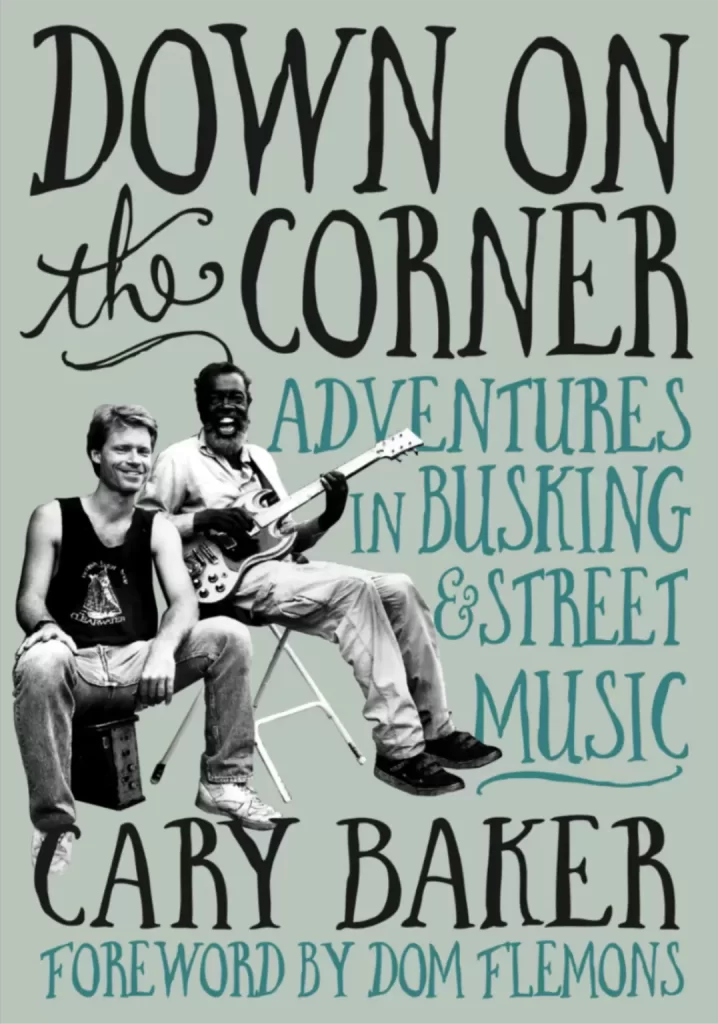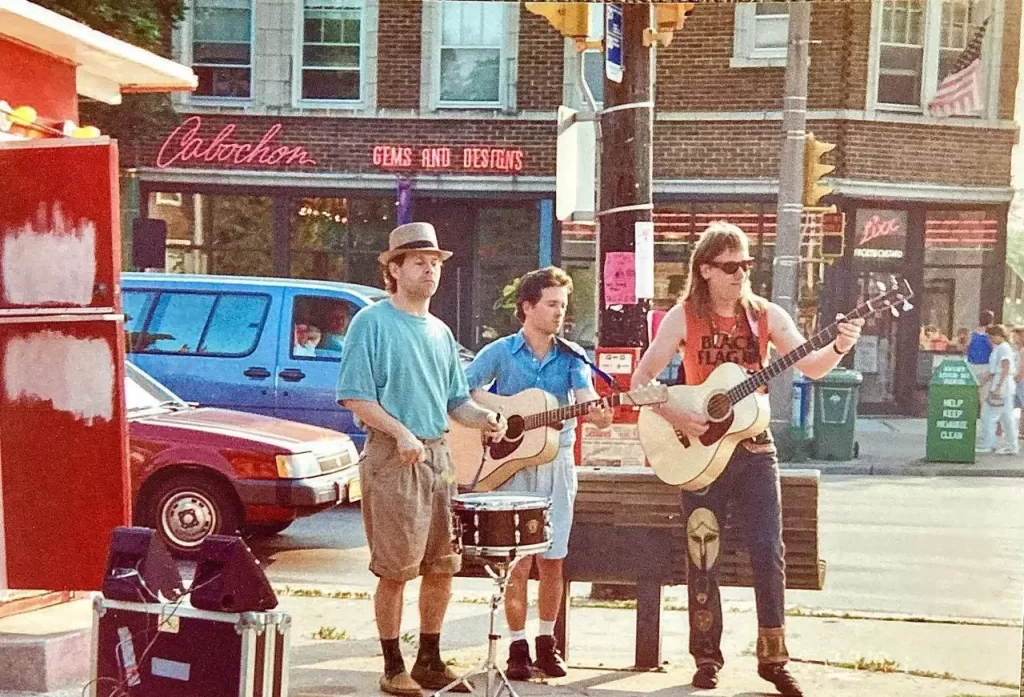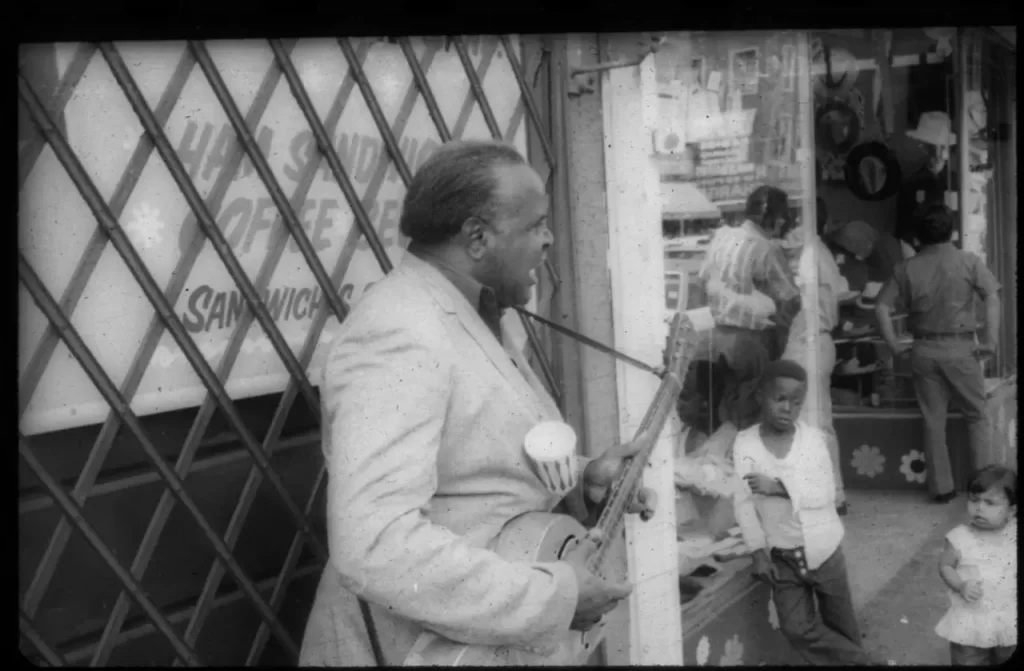“This book wrote itself,” says author and music industry veteran Cary Baker about his recently released Down On The Corner: Adventures in Busking and Street Music published by Jawbone Press. “The interviews flowed, and it was my sanity. It kept me glued during really too many transitions in my life: closing my PR firm, moving out of the big city (L.A.), and into the desert.
“It also told me when it was finished, although I beg to differ with that muse because I’ve since discovered so many artists worthy of capturing. But no book has 100 chapters. My book has 38. I interviewed 100 people, and that all just happened, but it wrote itself.”
His book tells the behind-the-scenes stories of musicians, some famous like Lucinda Williams and Elvis Costello, and some not so famous but just as colorful like Maxwell Street’s Arvella Gray and New Orleans’ Grandpa Elliott. Each of them led three lives, one personal, another on stage, and a third busking for change from Venice Beach in California to Dublin, Ireland.

“Ramblin’ Jack Elliott gave me a great story about how he was busking in the London Tube in the early ’60s, and there were a number of school children from London on the platform across the tracks. He noticed them, and they noticed him. Maybe 10 or 15 years later a guy comes up to him and says, ‘Hi, I’m Mick Jagger. You were playing in the subway station when I was on a school field trip, and I just wanted to thank you for that.’”
Cary talked to a publisher about possibly doing a book about roots rock singer Ted Hawkins. The publisher had never heard of Ted Hawkins. Cary told him Hawkins had been a busker. “What about buskers, plural?” was a publisher’s comeback. “And that’s the genesis of the book. That was an academic publisher. I ended up instead hiring a literary agent who got me to Jawbone Press in London which is a great publisher. I found it really exciting.”
After more than 60 years in the music business in many different jobs, Cary remains old school as a wordsmith. “Podcasts are not as close to my heart as the written word, and it doesn’t matter if it’s on paper or online. I like the written word, and that’s why I like books. Somebody asked if I was going to do an audio book. I had to write them back and say, ‘This is journalism. There are a lot of quotes. I can’t go in there and voice my questions alongside Ramblin Jack Elliott’s answers. An audio book is not going to happen.’ Again, for me it’s all about the written word.

“This book is the thing I’m most proud of in all my life and career. I have to say, I’m sitting here in my office surrounded by gold records by artists like R.E.M., Bonnie Raitt, and M.C. Hammer, although I have no (dealing) with them personally. So, I worked in artist development (with artists) like R.E.M. I had a predecessor with IRS Records who worked on their first album, but I took them the rest of the way. I got them the Creem cover and the first Rolling Stone cover and the first SNL appearance. So, to me that’s also something I look on with a lot of satisfaction, but the difference is I was in artist development for 40 years, artist services. So, this is really my chance to be the “artist,” and I’m cherishing that.
“I have a degree in journalism. I freelanced in everything from Living Blues to Trouser Press, Creem, Billboard, Chicago Reader, and Illinois Entertainer. I had quite some background in freelance writing. Part of one of my jobs was writing liner notes albeit anonymously. So, I have done some writing. What happened is I took a 40-year hiatus. I love writing, and I’m passionate about writing.
“I was real passionate about music, and I was really passionate about record companies and wanted to work for one. I got hired by Ovation Records a year or two after college. They had Willie Dixon and Mighty Joe Young, but also a lot of country hits. I thought I’d do that for a few years and go back to writing, but I got an offer from IRS Records at a time when they were breaking R.E.M. and signed Concrete Blonde, and I couldn’t refuse that. I moved to L.A., and I thought I’d do that for a few more years and then go back to writing. Then, I got an offer to work for Capitol Records. I worked for three more record companies and companies of my own, the last of which was (a public relations firm) Conqueroo, and I made a decision to close the company.”
The first chapter in the book is about Maxwell St. in Chicago, the Sunday morning go-to place for blues musicians to busk. “My father took me to Maxwell Street. (He went) there as a kid. It’s since gone. But that’s where Muddy Waters, Chuck Berry, Bobby Rush, B. B. King, Billy Boy Arnold, and Little Walter all played on the street in the ’40s, early ’50s and ’60s. So, by 1962 my father said to me there were artists like that still playing there: Arvella Gray, Big Jack Wrencher, and Maxwell Street Jimmy Davis.

“It was my pleasure and privilege when Canned Heat played the Aragon Ballroom around 1972 to take them to Maxwell St. They played Saturday night at the Aragon; I woke them up Sunday morning and took them to Maxwell St. and bought all kinds of records at the Maxwell Record and Radio Shop where you still could buy Little Walter 78s for a buck.”
Cary is working on his second book, a biography of an artist he refuses to reveal. He has written for American Blues Scene among other music publications. “All I can say is, I guess I’m doing it at this point for legacy purposes and not so much for the bottom line, and I do it after a 40-year hiatus.”
Down on the Corner: Adventures in Busking and Street Music is available for order here.